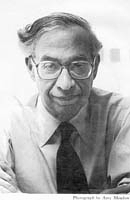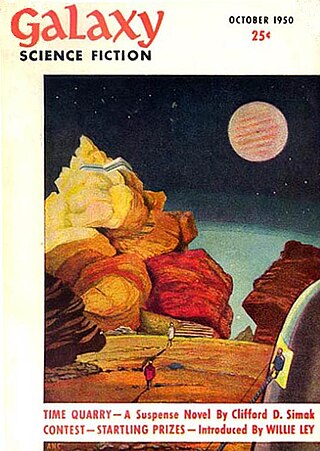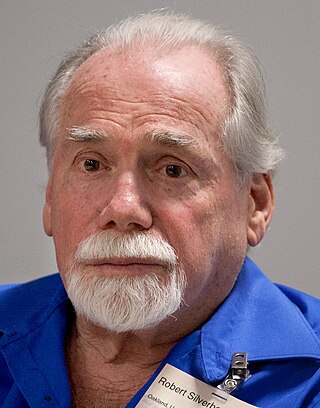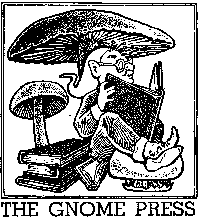
Alfred Elton van Vogt was a Canadian-born American science fiction author. His fragmented, bizarre narrative style influenced later science fiction writers, notably Philip K. Dick. He was one of the most popular and influential practitioners of science fiction in the mid-twentieth century, the genre's so-called Golden Age, and one of the most complex. The Science Fiction Writers of America named him their 14th Grand Master in 1995.

Donald Allen Wollheim was an American science fiction editor, publisher, writer, and fan. As an author, he published under his own name as well as under pseudonyms, including David Grinnell, Martin Pearson, and Darrell G. Raynor. A founding member of the Futurians, he was a leading influence on science fiction development and fandom in the 20th-century United States. Ursula K. Le Guin called Wollheim "the tough, reliable editor of Ace Books, in the Late Pulpalignean Era, 1966 and '67", which is when he published her first two novels in Ace Double editions.

James Benjamin Blish was an American science fiction and fantasy writer. He is best known for his Cities in Flight novels and his series of Star Trek novelizations written with his wife, J. A. Lawrence. His novel A Case of Conscience won the Hugo Award. He is credited with creating the term "gas giant" to refer to large planetary bodies.

Damon Francis Knight was an American science fiction author, editor, and critic. He is the author of "To Serve Man", a 1950 short story adapted for The Twilight Zone. He was married to fellow writer Kate Wilhelm.

Dangerous Visions is an anthology of science fiction short stories edited by American writer Harlan Ellison and illustrated by Leo and Diane Dillon. It was published in 1967 and contained 33 stories, none of which had been previously published.

Galaxy Science Fiction was an American digest-size science fiction magazine, published in Boston from 1950 to 1980. It was founded by a French-Italian company, World Editions, which was looking to break into the American market. World Editions hired as editor H. L. Gold, who rapidly made Galaxy the leading science fiction magazine of its time, focusing on stories about social issues rather than technology.

Lester del Rey was an American science fiction author and editor. He was the author of many books in the juvenile Winston Science Fiction series, and the editor at Del Rey Books, the fantasy and science fiction imprint of Ballantine Books, along with his fourth wife Judy-Lynn del Rey.

Robert Silverberg is an American author and editor, best known for writing science fiction. He is a multiple winner of both Hugo and Nebula Awards, a member of the Science Fiction and Fantasy Hall of Fame, and a Grand Master of SF. He has attended every Hugo Award ceremony since the inaugural event in 1953.

The Magazine of Fantasy & Science Fiction is a U.S. fantasy and science fiction magazine, first published in 1949 by Mystery House, a subsidiary of Lawrence Spivak's Mercury Press. Editors Anthony Boucher and J. Francis McComas had approached Spivak in the mid-1940s about creating a fantasy companion to Spivak's existing mystery title, Ellery Queen's Mystery Magazine. The first issue was titled The Magazine of Fantasy, but the decision was quickly made to include science fiction as well as fantasy, and the title was changed correspondingly with the second issue. F&SF was quite different in presentation from the existing science fiction magazines of the day, most of which were in pulp format: it had no interior illustrations, no letter column, and text in a single-column format, which in the opinion of science fiction historian Mike Ashley "set F&SF apart, giving it the air and authority of a superior magazine".
Orbit was a series of anthologies of new science fiction edited by Damon Knight, often featuring work by such writers as Gene Wolfe, Joanna Russ, R. A. Lafferty, and Kate Wilhelm. The anthologies tended toward the avant-garde edge of science fiction, but by no means exclusively; occasionally the volumes featured nonfiction critical writing or humorous anecdotes by Knight. Inspired by Frederik Pohl's Star Science Fiction series, and in its turn an influence on other original speculative fiction anthologies, it ran for over a decade and twenty-one volumes, not including a 1975 "Best of" collection selected from the first ten volumes.
Teonaht is a constructed language that has been developed since 1962 by science fiction writer and University of Rochester English professor Sarah Higley, under the pseudonym of Sally Caves. It is spoken in the fantasy setting of the Teonim, a race of polydactyl humans who have a cultural history of worshiping catlike deities.

Gnome Press was an American small-press publishing company primarily known for publishing many science fiction classics. Gnome was one of the most eminent of the fan publishers of SF, producing 86 titles in its lifespan — many considered classic works of SF and Fantasy today. Gnome was important in the transitional period between Genre SF as a magazine phenomenon and its arrival in mass-market book publishing, but proved too underfunded to make the leap from fan-based publishing to the professional level. The company existed for just over a decade, ultimately failing due to inability to compete with major publishers who also started to publish science fiction. In its heyday, Gnome published many of the major SF authors, and in some cases, as with Robert E. Howard's Conan series and Isaac Asimov's Foundation series, was responsible for the manner in which their stories were collected into book form.
Marta Randall is an American science fiction writer.

Far Horizons: All New Tales from the Greatest Worlds of Science Fiction is an anthology of original science fiction stories edited by Robert Silverberg, first published in hardcover by Avon Eos in May 1999, with a book club edition following from Avon and the Science Fiction Book Club in July of the same year. Paperback and trade paperback editions were issued by Eos/HarperCollins in May 2000 and December 2005, respectively, and an ebook edition by HarperCollins e-books in March 2009. The first British edition was issued in hardcover and trade paperback by Orbit/Little Brown in June 1999, with a paperback edition following from Orbit in July 2000.
Advent:Publishers is an American publishing house. It was founded by Earl Kemp and other members of the University of Chicago Science Fiction Club, including Sidney Coleman, in 1955, to publish criticism, history, and bibliography of the science fiction field, beginning with Damon Knight's In Search of Wonder.
Felix C. Gotschalk was an American psychologist and science fiction writer with a distinct, idiosyncratic style, his work marked by energetic exploration of social and sexual taboos.
"You're Another" is a science fiction short story by American writer Damon Knight. It first appeared in the June 1955 issue of The Magazine of Fantasy and Science Fiction and has been reprinted a number of times, including in the 1961 collection Far Out.

Witches Three is an anthology of three original fantasy stories, edited by the uncredited Fletcher Pratt and published in hardcover by Twayne in 1952. No further editions of the anthology were issued, but each of the stories was later republished.

An Infinite Summer is the second collection of science fiction short stories by British writer Christopher Priest and the first of his books to collect stories set in the Dream Archipelago. The stories had all previously been published in various anthologies and magazines; they may be described, somewhat interchangeably, as science fiction, fantasy literature, metafiction and macabre.

Nebula Award Stories 7 is an anthology of award-winning science fiction short works edited by Lloyd Biggle, Jr. It was first published in the United Kingdom in hardcover by Gollancz in November 1972. The first American edition was published by Harper & Row in January 1973; a Science Fiction Book Club edition, also in hardcover, followed in March of the same year. Paperback editions followed from Harrow Books in the U.S. in 1973, and Panther in the U.K. in December 1974. The American editions bore the variant title Nebula Award Stories Seven. The book has also been published in German.













